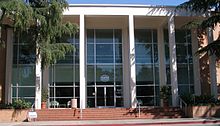 | |
 SRI International's headquarters in Menlo Park, California | |
| Formerly | Stanford Research Institute (1946–1970) |
|---|---|
| Company type | 501(c)(3) nonprofit scientific research institute |
| Industry | |
| Founded | Menlo Park, California (1946) |
| Founder | Trustees of Stanford University |
| Headquarters | Menlo Park, California, U.S. |
Area served | Worldwide |
Key people | David Parekh (CEO) |
| Services | |
| Revenue | US$410 million (2022)[1] |
Number of employees | 2,100 (as of February 2015[update])[2] |
| Website | sri |
SRI International (SRI) is a nonprofit scientific research institute and organization headquartered in Menlo Park, California, United States. It was established in 1946 by trustees of Stanford University to serve as a center of innovation to support economic development in the region.
The organization was founded as the Stanford Research Institute. SRI formally separated from Stanford University in 1970 and became known as SRI International in 1977. SRI performs client-sponsored research and development for government agencies, commercial businesses, and private foundations. It also licenses its technologies,[3] forms strategic partnerships, sells products,[4] and creates spin-off companies.[5] SRI's headquarters are located near the Stanford University campus.
SRI's annual revenue in 2014 was approximately $540 million, which tripled from 1998 under the leadership of Curtis Carlson. In 1998, the organization was on the verge of bankruptcy when Carlson took over as CEO. Over the next sixteen years with Carlson as CEO, the organizational culture of SRI was transformed. SRI tripled in size, became very profitable, and created many world-changing innovations using the NABC framework. One of its successes was Siri, a personal assistant on iPhone, which was developed by a company SRI created and then sold to Apple.[6] William A. Jeffrey served as SRI's president and CEO from September 2014 to December 2021, and was succeeded as CEO by David Parekh.
SRI employs about 2,100 people.[2] Sarnoff Corporation, a wholly owned subsidiary of SRI since 1988, was fully integrated into SRI in January 2011.[7]
SRI's focus areas include biomedical sciences, chemistry and materials, computing, Earth and space systems, economic development, education and learning, energy and environmental technology, security, national defense, sensing, and devices.[8] SRI has received more than 4,000 patents and patent applications worldwide.[9]
- ^ "Tax Filings and Audits by Year". ProPublica. 9 May 2013. Retrieved 2023-02-01.
- ^ a b "About Us". SRI International. Retrieved 2015-09-01.
- ^ "Products and Solutions: Technologies for License". SRI International. Archived from the original on 2015-04-29. Retrieved 2013-07-01.
- ^ "Products and Solutions". SRI International. Archived from the original on 2015-04-29. Retrieved 2014-05-17.
- ^ "SRI Ventures". SRI International. Retrieved 2013-07-01.
- ^ "How To Create An Innovative Culture: The Extraordinary Case Of SRI". Forbes. Retrieved 2022-01-29.
- ^ "SRI International Completes Integration of Sarnoff Corporation" (Press release). SRI International. 2011-01-01. Archived from the original on 2012-07-03. Retrieved 2002-07-01.
- ^ "SRI International". SRI International. Retrieved 2012-07-01.
- ^ "About Us". SRI International. 2014-10-20. Retrieved 2015-02-05.